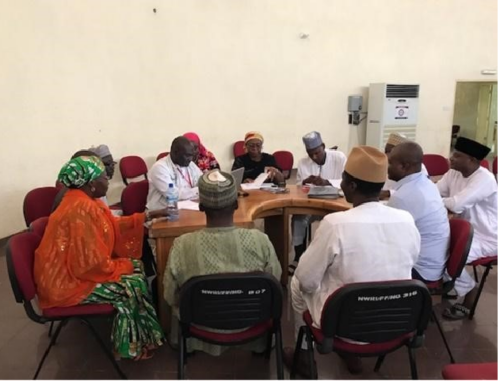Working together to Achieve Safe Urban Sanitation in Nigeria

The USAID WASH Stakeholder Retreat 2017 is the first for the Kaduna Environmental Protection Agency staff…and has widened our vision of the possibility…for a sanitation standard to deliver the desired outcome for man and the environment.
– Yusuf Rigasa, General Manager, Kaduna State Environmental Protection Agency
When General Manager Rigasa spoke those words, he had just spent three days discussing the potential for improved urban water, sanitation and hygiene (WASH) in Nigeria with 81 of his government colleagues as well as private service providers, development partners and civil society.
GM Rigasa and the other stakeholders were inspired to action by the increasing evidence of the extent and impact of failing water, sanitation and hygiene (WASH) services on the people of Nigeria. In a country of 182 million people, a full 71 percent[1] – 129 million men, women and children – lack access to unshared improved sanitation at the household level. The impact on those children is especially harsh with almost 40 percent of Nigerian children under five stunted[2]. In economic terms, poor sanitation is costing Nigeria around $2 billion each year[3].
USAID’s Water and Development Strategy[4] recognizes that safe improved sanitation is critical for the achievement of full health and economic benefits of WASH investments, and USAID is a long-standing partner to Nigeria in tackling the challenge of urban WASH. Building on its successful Sustainable Urban Water and Sanitation in Africa (SUWASA) program, USAID launched the WASH Coordination Project (WCP) in 2016 to generate critical, but often missing, sector data essential to the development of effective urban WASH programming and on immediate service improvements that help solidify commitment to reform in Bauchi and Kaduna States.
WCP’s design reflects the understanding that sanitation is not just an infrastructure problem. Instead, poor sanitation stems from a complicated web of demand, financing, institutional, and technical issues. WCP, therefore, is working to develop the data, information and collaborations that can untangle these webs and develop the will for improved practice. Specifically, WCP has:
- Conducted baseline surveys of sanitation practices in Bauchi and Kaduna;
- Developed Fecal Flow Diagrams[5] that illustrate the severity of the sanitation problem in key urban areas, triggering stakeholder action;
- Conducted baseline studies of gender inclusion in the WASH sector, including the gender and cultural issues that can limit demand for better sanitation; and
- Mapped the institutional roles and responsibilities related to sanitation and the linkages with other sector.
Armed with a clear understanding of the sector challenges, WCP and USAID were able to bring stakeholders together in Kaduna, and in a similar workshop in Bauchi, to agree on a new collaborative action plan toward specific improvements. This new framework for action provides real opportunity for change and a better future for the people of Kaduna and Bauchi.
By Timeyin Uwejamomere, Chief of Party for WASH Coordination Project at DIG (Development Innovations Group
[1] A Wake Up Call: Nigeria Water Supply, Sanitation, and Hygiene Poverty Diagnostic, World Bank 2017
[2] Demographic and Health Survey 2013.
[3] A Wake Up Call: Nigeria Water Supply, Sanitation, and Hygiene Poverty Diagnostic, World Bank 2017.
[4] https://www.usaid.gov/what-we-do/water-and-sanitation/water-and-development-strategy.
[5] http://www.susana.org/en/knowledge-hub/resources-and-publications/library/details/2610.

